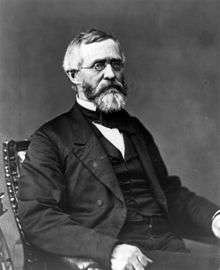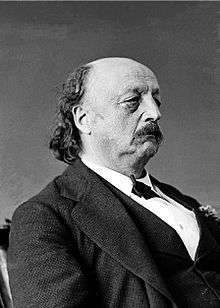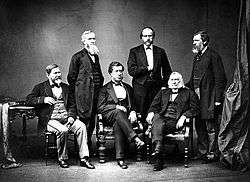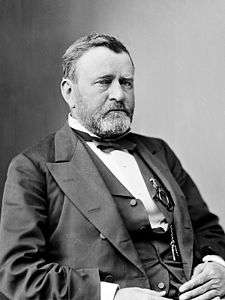Ebenezer R. Hoar
| Ebenezer Hoar | |
|---|---|
 | |
| 30th United States Attorney General | |
|
In office March 5, 1869 – November 22, 1870 | |
| President | Ulysses Grant |
| Preceded by | William Evarts |
| Succeeded by | Amos Akerman |
| Member of the U.S. House of Representatives from Massachusetts's 7th district | |
|
In office March 4, 1873 – March 4, 1875 | |
| Preceded by | Constantine Esty |
| Succeeded by | John Tarbox |
| Personal details | |
| Born |
Ebenezer Rockwood Hoar February 21, 1816 Concord, Massachusetts, U.S. |
| Died |
January 31, 1895 (aged 78) Concord, Massachusetts, U.S. |
| Political party |
Whig (Before 1854) Republican (1854–1895) |
| Spouse(s) | Caroline Brooks |
| Education | Harvard University (BA, LLB) |
Ebenezer Rockwood Hoar (February 21, 1816 – January 31, 1895) was an American politician, lawyer, and justice from Massachusetts. He was appointed U.S. Attorney General in 1869 by President Ulysses S. Grant; he became the first U.S. Attorney General to head the newly created Department of Justice in July 1870. As Attorney General Hoar worked with President Ulysses S. Grant and Secretary of State Hamilton Fish over contentious issues as settling the Alabama Claims with England and in keeping the United States from recognizing Cuban belligerency during the Ten Years' War. Hoar assisted Grant in appointing two Supreme Court justices that helped overturn a decision outlawing paper money as legal tender. Hoar himself, nominated by President Grant, was rejected by the Senate to fill a Supreme Court vacancy, in part due to senators' dismay over Hoar's resistance to distribution of federal patronage jobs without regard to the job applicant's capabilities.
Hoar's position on Grant's Cabinet was tenuous, since two Cabinet members, Secretary of the Treasury, George S. Boutwell and Hoar, were from Massachusetts, during an era when regionally balanced cabinets were an expected norm by members of the U.S. Senate. In June 1870, Hoar was asked to resign by President Grant; Hoar's unexpected resignation became controversial when his resignation letter to Grant was printed by news journals. Hoar departed from office in November 1870, upon the confirmation of Amos T. Akerman from Georgia.
Hoar came from a prominent Puritan family that had settled in Massachusetts in 1640. An exceptionally bright student from his youth, Hoar attended Harvard College starting in 1831 and graduated in 1835. After teaching and traveling in the West, Hoar returned to Concord and studied law, passing the bar in 1839. In 1846, Hoar was elected as a Whig to the Massachusetts State Senate. From 1849 to 1855, Hoar served on the Massachusetts court of common pleas. In 1859, Hoar was appointed to the Massachusetts Supreme Judicial Court, serving until his appointment as U.S. Attorney General in 1869. After serving as U.S. Attorney General, Hoar served on a joint high commission between the U.S. and the United Kingdom, which negotiated the Treaty of Washington (1871), which created an arbitration tribunal to settle the Alabama Claims against the United Kingdom, and created an arbitration process to settle other trade, territorial and maritime issues with the Dominion of Canada.
Hoar was a member of the Harvard College Board of Overseers from 1868 to 1882. In 1872, Hoar was elected as a Republican to the 43rd Congress, serving from 1873 to 1875. After his term as Congressman ended Hoar returned to his law practice in Concord and Boston, Massachusetts, working until his death in 1895.
Early life and career
Ebenezer Rockwood Hoar was born in Concord, Massachusetts, on February 21, 1816. Hoar came from a long line of Puritan ancestry, whose family had emigrated to America in 1640 to find religious liberty from England, initially settling in Braintree.[1] His father was Samuel Hoar and his mother was Sarah Sherman.[2] Hoar was sent to a religious private female teacher at the early age of two where in a matter of weeks acquired learning as if he had gone to a public instructor. By the age of three years, Hoar was able to read the Bible fluently as an adult.[3] By the age of four, Hoar was literate; having excelled his older sister in reading and writing. As Hoar grew up he was known for quick thinking and witty sayings.[4] After attending a preparatory Academy, Hoar entered Harvard University at the age of fifteen in 1831.[5] After graduation in 1835, Hoar moved West and served as an instructor at a school for girls in Pittsburgh, Pennsylvania.[6] After teaching in Pittsburgh, Hoar traveled to Kentucky and heard the famous politician Henry Clay speak, afterwards he then returned safely to Concord where he began to study law at his father's office.[7] Hoar returned to Harvard where he studied law for eighteen months and for six months in the law office of Emory Washburn. On September 30, 1839, Hoar passed the bar and had received a LL.B. degree from Harvard, where upon he practiced law in 1840 in Concord and Boston.[8]
Marriage and family
While studying law at Harvard University, Hoar met Caroline Downes Brooks (1820–1892) of Concord, and the two married on November 20, 1840. Their marriage produced seven children, Caroline, Samuel, Charles Emerson, Clara Downes, Elizabeth, and Sherman; Sarah Sherman died an infant. The Hoar marriage was happy; however, Caroline had suffered from illness for many years.[9]
Massachusetts state senator and justice
Hoar began his political career during the 1840s and associated himself with the anti-slavery section of the Whig Party.[10] Hoar stated that he was a Conscience Whig rather than a Cotton Whig that represented Southern interests in slavery. In 1846 Hoar was elected to the Massachusetts Senate as an anti-slavery Whig. In 1848, Hoar worked with his father to form the Free Soil Party in Massachusetts.[10] This party opposed the extension of slavery in the Western territories and as a result would curb the federal legislative power of the southern slaves states. Hoar was a Judge of the Court of Common Pleas in Boston from 1849 until 1855. From 1859 to 1869 Hoar was an Associate Justice of the Massachusetts Supreme Judicial Court. While on the bench Judge Hoar was known for his critiquing of younger lawyers; one of these young lawyers who impressed Hoar was Oliver Wendell Holmes, Jr. After the American Civil War, Hoar opposed the impeachment of President Andrew Johnson.[10]
Attorney General (1869–1870)
On March 5, 1869 President Ulysses S. Grant appointed Hoar the 30th Attorney General of the United States.[11] All of Grant's appointments, including Hoar's, were initially a shock to the Senate, since Grant chose his cabinet independently from leaders of the Republican Party.[12][13] The Senate immediately approved all of Grant's appointments, including Hoar's, and the press reaction was generally optimistic, having viewed Grant's cabinet free from "trickery and corruption".[12] Hoar was Grant's principle legal and political advisor, since Grant had never held public elected office until his election to the presidency.[12][14] In July 1870, Att. Gen. Hoar was the first to head the Department of Justice, created to strengthen the enforcement and investigation powers of the President. Hoar's tenure in office as U.S. Attorney General would last for a little over a year.
Stewart ruling
Although the Senate approved all of Grant's appointments, Alexander T. Stewart, a prosperous New York retailer appointed Secretary of the Treasury, was considered ineligible to hold office, due to an 1789 law that stated no person could head the Treasury Department who was "concerned or interested in carrying on the business of trade or commerce".[15] Grant's effort to have an exemption written into the law for Stewart failed, due to the opposition of Senators Charles Sumner and Roscoe Conkling.[16] One of Hoar's first duties as Attorney General was to rule on the Stewart appointment. Stewart had proposed he renounce his legal title to any retail business until after his potential term ended; however, Att. Gen. Hoar advised Grant that Stewart's plan was impractical.[17] Taking Hoar's advice, Grant accepted Stewart's offer to step down, and appointed George S. Boutwell as Secretary of the Treasury.[17] Boutwell's appointment, however, made Att. Gen. Hoar's continuance on Grant's Cabinet tenuous, since both Boutwell and Hoar were from Massachusetts during an era in which it was traditional and politically expedient to have no more than one presidential cabinet member from any single state.[18]
Nominated Supreme Court Justice
On December 14, 1869, President Grant nominated Att. Gen. Hoar to be an Associate Justice of the Supreme Court, but he was not confirmed by the United States Senate.[19] Conservative Republican Senators were indignant of Hoar's refusal to appoint Circuit Court judges by patronage and for Hoar's previous opposition to the impeachment of Andrew Johnson.[20] Sen. Benjamin F. Butler had also long been at odds with Att. Gen. Hoar in both social and political life. Butler would always create a nasty scene whenever he had to appear before Judge Hoar on the Massachusetts bench, regardless of holding any dignity of the court. In the Senate, Butler led the effort to vote down Hoar's nomination. Hoar's defeat created continual hostility between Butler and Hoar.[2]
Hepburn v. Griswold reversed
In 1870 President Grant needed to fill in two Supreme Court vacancies, in part to fulfill a new law that established nine justices on the Supreme Court. President Grant had nominated both Hoar and former Secretary of War Edwin Stanton. Although Hoar had been rejected by the Senate, Stanton was confirmed immediately, however, Stanton died before he could take office.[21] Att. Gen. Hoar and President Grant had a long conversation and on the advice of Hoar, Grant nominated two leaders in the American Bar, William Strong and Joseph P. Bradley.[21] Both Strong and Bradley were confirmed by the Senate to become Supreme Court Justices. One hour after both Strong and Smith names had been submitted to the Senate, the Supreme Court ruled in Hepburn v. Griswold that the 1862 Legal Tender Act that had authorized the Treasury to print paper money as legal tender was unconstitutional.[21] President Grant, Hoar, and his entire cabinet had been against the Court's 4–3 Hepburn ruling, believing that the nation's money supply would be reduced and that this would ruin the economy.[22] On March 31, 1870, Attorney General Hoar went before the Supreme Court and argued that the Hepburn decision caused instability in the national economy, in case the country needed to print money during an emergency, as had been done during the American Civil War.[23] One year later, with Justice Strong and Justice Bradley on the bench, the Supreme Court reversed the Hepburn ruling in a 5–4 decision, making paper money legal tender.[23] Although President Grant and Hoar were accused of packing the court, Strong and Smith's names had been submitted to the Senate prior to the Hepburn decision.[23][24]
Reconstruction
During the Reconstruction Era, slavery was abolished under the Thirteenth Amendment and African Americans received U.S. citizenship and suffrage rights under the Fourteenth and Fifteenth Amendments, respectively. However, opposition to freedmen grew within the South as the Ku Klux Klan committed violent acts against blacks.[25] Hoar was a moderate Republican who opposed federal intervention in protecting African American citizens.[26] Hoar believed that Southerners would behave responsibly and find a way to protect African Americans.[26] President Grant, however, had lost faith in the Southerners to comply with constitutional and federal law that protected African Americans.[26] In May 1870, Congress passed the first of three anti-terrorism laws known as Enforcement Acts to counter Klan violence in the South. In order to increase President Grant's investigative and enforcement powers to prosecute persons who violated constitutional and federal law, Congress and President Grant created the Department of Justice and Solicitor General in June 1870.[27] President Grant was under increased pressure to replace Hoar with a more Radical Attorney General, who did not oppose federal intervention to stop lawlessness in the South.[28]
Resignation

Hoar and Bulter remained bitter political rivals.
In June 1870, President Grant sent Hoar a letter that requested his resignation without explanation.[29] Hoar was initially shocked at the sudden resignation request, and went to see Grant, having previously taken pardon requests to Grant at the White House.[29] President Grant told Hoar that Southern Senators wanted a Southerner in the cabinet and that he needed support from Southern Senators.[29] Knowing that his resignation had to do with Reconstruction, Hoar complied and sent Grant a letter of resignation.[29] Controversy ensued when Grant's personal secretaries allowed Hoar's resignation letter to be disclosed to the press.[28] None of Grant's other cabinet members knew that Grant had asked for Hoar's resignation.[30][31]
Republican Southern Senators were upset that Hoar had not used patronage to fill circuit court openings. U.S. Representative Benjamin Butler from Massachusetts, Hoar's political enemy, in a meeting with President Grant had told Grant that Hoar did not support the annexation of Santo Domingo, and that Hoar, as a moderate Republican, was not strong on supporting African American civil rights in the South.[32] President Grant had attempted to annex Santo Domingo in order to put pressure on Southern conservatives to relieve the plight of African Americans in the South. Hoar later realized having two cabinet members from Massachusetts affected his tenure as a cabinet member. Hoar remained on Grant's cabinet until November 1870, when his successor Amos T. Akerman was sworn in. Akerman was from Georgia, an aggressive attorney who supported Congressional Reconstruction and protected African American civil rights.[31][33]
Alabama claims commissioner (1871)

Hoar was one of five United States members of a joint high commission with the United Kingdom to settle Civil War claims, and also territorial claims in relation to the Dominion of Canada. The commission's work led to the signing of the Treaty of Washington in 1871.
The treaty defined a method for international arbitration to settle disputed sovereign maritime and territorial issues, and also clarified the rules for maritime trade between Canada and the United States, especially in the Great Lakes and the St. Lawrence. The issues deferred to the defined arbitration process were: the Alabama Civil War claims; other claims and counterclaims growing out of the Civil War; the San Juan water boundary with the Dominion of Canada in Puget Sound; and Nova Scotia fishery rights. A subsequent joint arbitration commission, acting under the treaty, issued a decision in September 1872, rejecting American claims for indirect war damages but did order Britain to pay the United States $15.5 million as compensation for the Alabama claims.[34][35][36]
U.S. Representative (1873–1875)
Hoar was elected as a Republican to the 43rd Congress (1873–75). He was not a candidate for renomination in 1874 and returned to practicing law. He chaired the 1875 U.S. Centennial celebration of the Battles of Lexington and Concord, held in Concord and attended by many leading individuals of the day, including President Grant.[34]
Harvard overseer
He served on the board of overseers of Harvard University from 1868 through 1882.
Death
Hoar died in Concord in 1895. He is interred in Concord's Sleepy Hollow Cemetery.
Hoar family relations
Hoar's brother George Frisbie Hoar was influential congressman and senator for Massachusetts. His father Samuel Hoar was an influential lawyer and politician. Through his mother, Sarah Sherman, he was the grandson of American founding father Roger Sherman and Rebecca Minot Prescott. His children include Massachusetts State Representative Sherman Hoar (1860–1898) and Samuel Hoar (1845–1904); and he was the grandfather of Massachusetts State Senator and Assistant Attorney General Roger Sherman Hoar.
- Hoar's first cousin Roger Sherman Baldwin was Governor of Connecticut and a U.S. senator; and William Maxwell Evarts was U.S. Secretary of State, U.S. Attorney General immediately preceding Hoar, and a U.S. senator.
See also
References
- ↑ Storey-Emerson, p. 2
- 1 2 The New York Times (February 1, 1895), E. Rockwood Hoar Dead
- ↑ Storey-Emerson, p. 11
- ↑ Storey-Emerson, p. 13
- ↑ Storey-Emerson, pp. 16-17
- ↑ Storey-Emerson, pp. 26–27
- ↑ Storey-Emerson, p. 28
- ↑ Storey-Emerson, p. 30
- ↑ Storey-Emerson, p. 32
- 1 2 3 Gale Encyclopedia of American Law, "Hoar, Ebenezer Rockwood", vol. 5, 3rd ed, pp. 285–286
- ↑ The New York Times (March 6, 1869), Official Announcement of President Grant's Cabinet
- 1 2 3 Smith, p. 469
- ↑ Storey-Emerson, p. 162
- ↑ Storey-Emerson, p. 165
- ↑ Smith, p. 470
- ↑ Smith, p. 468
- 1 2 Storey-Emerson, p. 166
- ↑ Storey-Emerson, p. 171
- ↑ Smith, pp. 506–507
- ↑ Gale Encyclopedia of American Law, pp. 285–286
- 1 2 3 Smith, p. 507
- ↑ Smith, pp. 507–508
- 1 2 3 Smith, p. 508
- ↑ Storey-Emerson, p. 199
- ↑ Smith, pp. 543–544
- 1 2 3 McFeely, pp. 365–366
- ↑ Smith, p. 544
- 1 2 McFeely, p. 366
- 1 2 3 4 McFeely, p. 365
- ↑ Storey-Emerson, p. 208
- 1 2 Cox, Jacob Dolson (August 1895). "How Judge Hoar ceased to be Attorney-General". The Atlantic Monthly. 76 (454): 162–173. Retrieved September 30, 2012.
- ↑ McFeely, pp. 364–365
- ↑ McFeely, p. 369
- 1 2 Robbins, Paula The Hoar Family Dictionary of Unitarian & Universalist Biography. Unitarian Universalist Historical Society. Retrieved January 30, 2007.
- ↑ "The Alabama Claims". United States Department of State. n.d. Retrieved September 30, 2012.
- ↑ Office of the State Historian (n.d.). "The Alabama Claims, 1862-1872". United States Department of State. Retrieved September 30, 2012.
Sources
- United States Congress. "Ebenezer R. Hoar (id: H000653)". Biographical Directory of the United States Congress. "HOAR, Ebenezer Rockwood, (1816–1895)"
- Butler, Benjamin Franklin. Letter of General Benj. F. Butler, to Hon. E. R. Hoar. [Lowell?, Mass.]: N.p., 1876.
- Cox, Jacob Dolson. How Judge Hoar Ceased to be Attorney General. Atlantic Monthly July 1895, p. 162–173. (Available online: Making of America. Cornell University Library)
- Hoar, Ebenezer Rockwook. "Charge to the Grand Jury, at the July Term of the Municipal Court, in Boston, 1854". Little Brown and Company. 1854.
- Hoar, Ebenezer Rockwood. Address at the laying of the corner stone of the Memorial Hall. Boston: Tolman & White, printers, 1870.
- Hoar, Ebenezer Rockwood. Address in the old Concord Meeting House, April 19, 1894. Boston: Beacon Press, T. Todd, printer, 1894.
- Hoar, George Frisbie. The charge against President Grant and Attorney General Hoar of packing the Supreme Court of the United States. Worcester, Mass.: Press of C. Hamilton, [1896?]
- Massachusetts. Bar. Tributes to the Bar and of the Supreme Judicial Court of the Commonwealth to the memory of Ebenezer Rockwood Hoar. Cambridge, Mass.: J. Wilson and Son, University Press, 1895.
- "E. Rockwood Hoar Dead". The New York Times. February 1, 1895. Retrieved 2012-05-15.
- Storey, Moorfield, and Edward W. Emerson. Ebenezer Rockwood Hoar: A Memoir. Boston and New York: Houghton Mifflin, 1911.
External links
| Wikimedia Commons has media related to Ebenezer Rockwood Hoar. |
| Wikisource has the text of a 1892 Appletons' Cyclopædia of American Biography article about Ebenezer R. Hoar. |
- Ebenezer Rockwood Hoar US Department of Justice
- Dictionary of Unitarian & Universalist Biography: The Hoar Family
- Supreme Judicial Court of Massachusetts: Office of Reporter of Decisions (1804 – present) 163 Mass. 597 (1895) Ebenezer R. Hoar Memorial
- Ebenezer Hoar Papers: University of Michigan
- Sherman Genealogy Including Families of Essex, Suffolk and Norfolk, England By Thomas Townsend Sherman
- Baldwin-Greene-Gager family of Connecticut at Political Graveyard
- Sherman-Hoar family at Political Graveyard
| Legal offices | ||
|---|---|---|
| Preceded by Benjamin Thomas |
Associate Justice of the Massachusetts Supreme Judicial Court 1859–1869 |
Succeeded by Marcus Morton |
| Preceded by William Evarts |
United States Attorney General 1869–1870 |
Succeeded by Amos Akerman |
| U.S. House of Representatives | ||
| Preceded by Constantine Esty |
Member of the U.S. House of Representatives from Massachusetts's 7th congressional district 1873–1875 |
Succeeded by John Tarbox |



